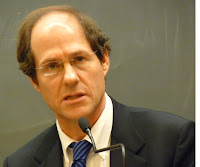QUOTE: Cass R. Sunstein & Adrian Vermeule Is Capital Punishment Morally Required? The Relevance of Life-Life
Trade-offs 58 Stan. L. Rev. 703 (Jan. 2006) – Many
people believe that the death penalty should be abolished even if, as recent
evidence seems to suggest, it has a significant deterrent effect. But if such
an effect can be established, capital punishment requires a life-life
trade-off, and a serious commitment to the sanctity of human life may well
compel, rather than forbid, that form of punishment. The familiar problems with
capital punishment— potential error, irreversibility, arbitrariness, and racial
skew—do not require abolition because the realm of homicide suffers from those
same problems in even more acute form. Moral objections to the death penalty
frequently depend on a sharp distinction between acts and omissions, but that
distinction is misleading in this context because government is a special kind
of moral agent. The widespread failure to appreciate the life-life trade-offs
potentially involved in capital punishment may depend in part on cognitive
processes that fail to treat “statistical lives” with the seriousness that they
deserve. The objection to the act/omission distinction, as applied to government,
has implications for many questions in civil and criminal law.
AUTHOR 1: Cass R. Sunstein (born September 21, 1954) is an American legal
scholar, particularly in the fields of constitutional law, administrative law,
environmental law, and law and behavioral economics, who currently is the
Administrator of the White House Office of Information and Regulatory Affairs
in the Obama administration. For 27 years, Sunstein taught at the University of
Chicago Law School, where he continues to teach as the Harry Kalven Visiting
Professor. Sunstein is currently Professor of Law at Harvard Law School, where
he is on leave while working in the Obama administration.
AUTHOR 2: Adrian Vermeule, who is a graduate of Harvard College and Harvard
Law School, has been Professor of Law at Harvard Law School since 2006 and was
named John H. Watson Professor of Law in 2008. He was a Visiting Professor of
Law in 2005. His writings focus on institutional theory, and he teaches
Administrative Law, Legislation, Constitutional Law, and National Security Law.
Vermeule was on the faculty of the University of Chicago Law School from 1998
to 2005. There, he was twice awarded the Graduating Students’ Award for
Teaching Excellence, in 2002 and 2004. Before entering teaching, he served as a
clerk to Supreme Court Associate Justice Antonin Scalia and Judge David
Sentelle of the U.S. Court of Appeals for the District of Columbia Circuit.



No comments:
Post a Comment